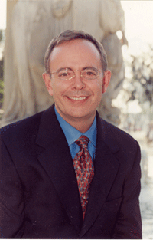Farewell, Phil
Air Date: Week of September 19, 2008

The late Philip Clapp. (Courtesy of National Environmental Trust)
Philip Clapp was a powerful force for action on environmental issues from drinking water quality and over-fishing to global warming and the protection of wilderness. He led the National Environmental Trust for 14 years. Kevin Knobloch, head of the Union for Concerned Scientists, offers this tribute.
Transcript
GELLERMAN: Over the years, when we at Living on Earth needed information about a wide variety of environmental issues, we often turned to Philip Clapp. And Phil was always there for us - wise and funny and kind. Phil Clapp was Deputy Managing Director of the Pew Trust’s Environmental Program. His specialty was global warming, and this is what he told us back in 1997, after the first Kyoto climate change summit.
CLAPP: The most important piece is that we have to work with the developing countries to bring them in, in a way that recognizes their level of economic development, the aspirations of their people for an improved lifestyle. I felt one of the most apt statements at this conference was someone said that what we really had here was the nations of sport utility vehicles telling the nations who rode bicycles that they could never even have a scooter. And that, in essence, is a very, very serious limitation on their ability to improve their lifestyles. And what we have to do is put together a package that really recognizes their state of development.
GELLERMAN: The world will have to come to terms with climate change without the wisdom and wit of Philip Clapp. He died September 17th at the age of 54.
Kevin Knobloch, the Executive Director of the Union of Concerned Scientists was Phil Clapp’s friend and colleague.
KNOBLOCH: News of Phil’s death hit me like a stun gun. This is a guy who fearlessly leads the charge, whether everyone else is following or not. You want him by your side in a tough fight, analyzing the options, designing the plays, setting the pace.
Our work is now much harder without him.
I met Phil twenty-five years ago in the Rayburn House Office Building in Washington. He was serving as legislative director to an enormously talented Representative from Colorado, Tim Wirth, and I worked for another progressive Democrat down the hall.
Phil dressed more snappily than the average Congressional aide, and he talked about ways to fight off efforts to weaken air quality and advance drinking water protections with a puckish smile.
Working with Tim in the early 1980s, he was one of the few prescient voices calling the alarm that our planet was heating up. Many of the laws that help Americans live longer and breathe easier have Phil’s imprint on them.
Then there’s the harmful proposals that Phil helped stop before they became law. In the mid-90s, Newt Gingrich and his Contract With America threatened environmental and health protections. Phil founded the National Environmental Trust in response, and orchestrated the skillful campaign that outfoxed much better funded polluting interests. He helped Americans see that the benefits of those laws far outweighed the modest costs.

The late Philip Clapp. (Courtesy of National Environmental Trust)
At the international climate negotiations, from Kyoto in 97 to Bali last December, delegates and reporters from all over the world sought Phil out to decipher procedural mysteries and provide a razor sharp analogy.
He called the domestic auto companies America’s “can’t do” industry as they refused to build the fuel-efficient cars and trucks that they had the technology and talent to do.
You knew it when Phil showed up. His lean frame and outsized gestures made him seem a foot taller than he was. The antidote to a stuffy room full of self-important people was to sit next to Phil just to hear his hilarious and piercing commentary.
Phil died in a city he loved, Amsterdam, and that seems like a blessing among the deep sadness. God bless you, Phil.
GELLERMAN: Kevin Knobloch is Executive Director of the Union of Concerned Scientists.
[MUSIC: Abdullah Ibrahim “The Mountain Of The Night” from African River (Enja 1989)]
GELLERMAN: Just ahead, the science and politics of grizzly bear DNA. Stay tuned to Living on Earth.
Links
To hear or read Living on Earth interviews with Phil Clapp, click here
Living on Earth wants to hear from you!
Living on Earth
62 Calef Highway, Suite 212
Lee, NH 03861
Telephone: 617-287-4121
E-mail: comments@loe.org
Newsletter [Click here]
Donate to Living on Earth!
Living on Earth is an independent media program and relies entirely on contributions from listeners and institutions supporting public service. Please donate now to preserve an independent environmental voice.
NewsletterLiving on Earth offers a weekly delivery of the show's rundown to your mailbox. Sign up for our newsletter today!
 Sailors For The Sea: Be the change you want to sea.
Sailors For The Sea: Be the change you want to sea.
 The Grantham Foundation for the Protection of the Environment: Committed to protecting and improving the health of the global environment.
The Grantham Foundation for the Protection of the Environment: Committed to protecting and improving the health of the global environment.
 Contribute to Living on Earth and receive, as our gift to you, an archival print of one of Mark Seth Lender's extraordinary wildlife photographs. Follow the link to see Mark's current collection of photographs.
Contribute to Living on Earth and receive, as our gift to you, an archival print of one of Mark Seth Lender's extraordinary wildlife photographs. Follow the link to see Mark's current collection of photographs.
 Buy a signed copy of Mark Seth Lender's book Smeagull the Seagull & support Living on Earth
Buy a signed copy of Mark Seth Lender's book Smeagull the Seagull & support Living on Earth

